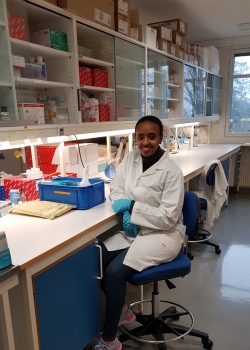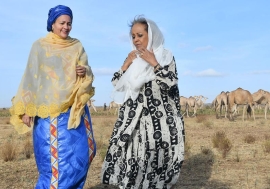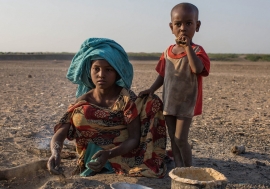Selamawit Araya Kidane (from Ethiopia) speaks about her journey to being a nematologist [they study roundworms that feed on microscopic forms of life such as bacteria and affect plants, animals and humans]; as well as her research on the Enset plant – often referred to as a ‘false banana’ because while it resembles a banana plant, it does not produce edible fruits. Its stem, leaf sheaths and underground corm are harvested and processed into carbohydrate-rich food products:

Tell us about yourself. Where were you born and where did you grow up?
I was born in Saudi Arabia to Ethiopian immigrant parents. We moved to Addis Ababa, Ethiopia, when I was nine years old.
What inspired you about science in general, and specifically the nematology field of research?
In high school, I developed a strong passion for biology. I was especially interested in plant physiology and genetics. I obtained a BSc in Horticulture in 2008 from Jimma University in Ethiopia. Plant pathology was a significant area of my undergraduate studies, and it was how I came across nematodes — microscopic worm-like animals that are present in every environment across the globe. I was fascinated by these tiny, yet important creatures and I wanted to learn more about them. But there was little information on the topic. In 2010, I successfully applied for a VLIR-UOS scholarship to pursue an MSc in Nematology at Ghent University, Belgium. [VLIR-UOS scholarships are awarded to students from Africa, Asia and Latin America to Master's programmes at a Flemish university].
Tell us a bit more about nematodes?
Nematodes can be free-living in soil and water, where they feed on microorganisms (bacteria, fungi, algae, other nematodes) and organic debris. They can also be parasitic, causing significant harm to people, animals and plants. My MSc research focused on a nematode species known scientifically as Caenorhabditis Elegans - which has been used over the ages as a model organism to study several conditions in people and animals. Our study used this particular nematode to explore issues of ageing.
What is your PhD research focus?
Thanks to a collaborative partnership between Ghent University and the International Institute of Tropical Agriculture (IITA), I connected with nematology researchers working in Africa. After a brief stint as a programme officer at the Ethiopian Agricultural Transformation Agency, I was offered an opportunity to undertake a PhD at the Norwegian University of Life Sciences, under the joint supervision of nematologists at IITA and the International Centre of Insect Physiology and Ecology (ICIPE). My studies are supported by the Norwegian Agency for Development Cooperation (NORAD). My research aims to investigate the impact of plant parasitic nematodes on the Ensent plant and how the damage caused can be managed.
How important is Enset as a food crop?
While largely unknown outside Ethiopia, Enset is an important staple food crop in the country, with approximately 20 per cent of the population (over 20 million people) depending on it. Although wild Enset can be found across Africa, it is has only been domesticated in Ethiopia. Enset is primarily cultivated in the southern and south-western regions of the country, where it is a culturally and agriculturally symbolic crop, providing food security, cash income and animal feed, as well as preventing erosion and soil loss on the steep highlands. One of the best known Enset dishes is Kocho, a bread-like fermented food often used in place of Ethiopia’s famous dish Injera. The importance of Enset was evident during the severe famine in Ethiopia in the 1980s, which left Enset-growing communities largely unaffected.
What have been the achievements of your research?
Enset remains marginalized by researchers, with minimal scientific studies conducted on it. Even less is known about the plant parasitic nematodes that affect it, the damage they cause or how to manage them. As such, our research has been groundbreaking in many ways. We have conducted the largest survey to date to establish which nematode species are present and which pose the greatest threat to Enset. For the first time, we evaluated the role of planting material in the spread of these pests and assessed common varieties for potential resistance against them.
SDG 2: Zero Hunger, calls for ending hunger in the world by 2030. However, this goal does not seem to be on target, especially considering the effects of the COVID-19 pandemic, which is projected to substantially increase the number of hungry people. Therefore, it is important that we change the global food and agriculture system. Over-reliance on a select group of staple crops is a risk the world can no longer afford. As such, neglected orunderutilized crops, which include ancient species like Enset, need to be mainstreamed. Our study has set the scene for further research to improve the production of Enset. We have also developed a range of protocols, devised new techniques and methods, and raised awareness for investigations and management of plant parasitic nematodes, which adversely affect most, if not all, cultivated crops, causing damage worth billions of dollars annually.
Have there been any influences during your academic journey? Who are your key mentors?
My main influence was my mother. Having had no formal education herself, she was determined that her children, including myself, her only daughter, would advance as far as possible. My supervisor and mentor Dr. Danny Coyne, Soil Health Scientist and expert in plant nematology at IITA, has shared his wisdom, guided and motivated me, and reminded me of the end goal of our research: improving the lives of African smallholder farmers.











